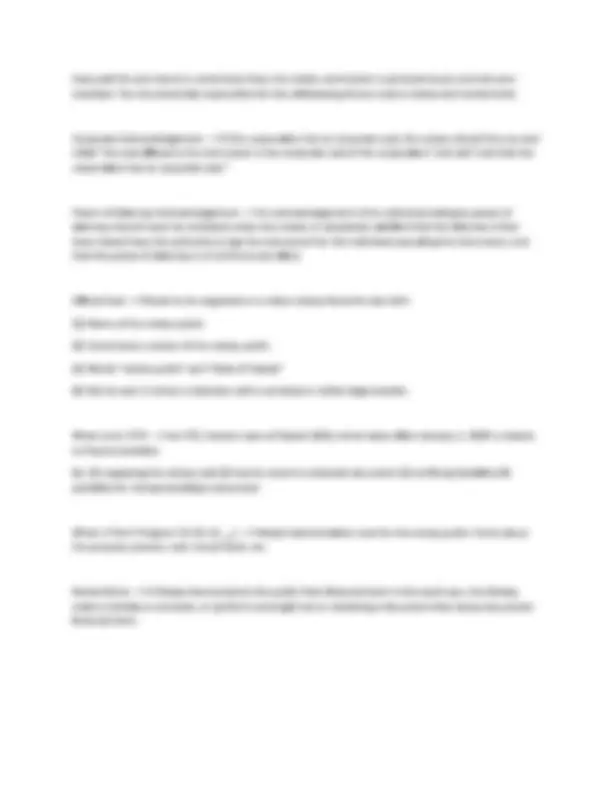









Study with the several resources on Docsity

Earn points by helping other students or get them with a premium plan


Prepare for your exams
Study with the several resources on Docsity

Earn points to download
Earn points by helping other students or get them with a premium plan
Community
Ask the community for help and clear up your study doubts
Discover the best universities in your country according to Docsity users
Free resources
Download our free guides on studying techniques, anxiety management strategies, and thesis advice from Docsity tutors
Notary Public's Functions - >>(1) administering oaths; (2) witnessing the signing of documents; (3) attesting to the identity of the signers of the document; (4) noting protests; and (5) taking acknowledgments of documents. Whom is a notary public is required to provide notarial service to? - >>Although a notary public may be commissioned to perform services in connection with work for his/her employer, the notary is nonetheless required to provide notarial service to the general public. Hawaii's Qualifications - >>(1) A United States citizen/has a U.S. citizenship; (2) A Hawaii resident (3) At least 18 years old Application Process - >>(1) Apply online; Pay non-refundable application fee; Submit a letter of character
Typology: Exams
1 / 13

This page cannot be seen from the preview
Don't miss anything!








Notary Public's Functions - >>(1) administering oaths; (2) witnessing the signing of documents; (3) attesting to the identity of the signers of the document; (4) noting protests; and (5) taking acknowledgments of documents. Whom is a notary public is required to provide notarial service to? - >>Although a notary public may be commissioned to perform services in connection with work for his/her employer, the notary is nonetheless required to provide notarial service to the general public. Hawaii's Qualifications - >>(1) A United States citizen/has a U.S. citizenship; (2) A Hawaii resident (3) At least 18 years old Application Process - >>(1) Apply online; Pay non-refundable application fee; Submit a letter of character and a letter of justification. (2) Upon approval by the Attorney General, the applicant cant take a written closed-book exam. (3) Pass the exam (with a score of 80% or higher) and pay the commission fee. The exam covers statutory laws and administrative rules that apply to notaries public, as well as practical aspects of a notary's practice, and a notary's duties and responsibilities. Tenure - >>The term of commission of a notary public shall be four (4) years from the date of the notary's commission. How many days must a notary report a change in the notary's office, occupation, residence, or employment? - >>In writing to the Attorney General within 30 days of the change.
What happens when a notary fails to renew a commission in a timely manner? - >>The commission will be forfeited if the Attorney General finds that the failure was done knowingly. What needs to be done to renew a commission? - >>Submit a completed renewal application, pay the renewal fee, OR complete the processing and filing of a commission for renewal by the date of expiration of the commission. What are the administrative fees for failure to turn in any changes to the Attorney General? - >>Failure to provide written timely notification to the attorney general of any change shall subject the notary to a $25 administrative fine. Failure to provide written timely notification to the attorney general of any change of address that results in renewal forms being mailed to an incorrect address shall subject the notary to a $ administrative fine. Failure to Renew a Commission - >>The failure to renew a commission in a timely manner may cause the commission to be forfeited if the Attorney General finds that the failure was done knowingly. A notary's forfeited commission more than one year from the date of expiration of the commission shall reapply as a new applicant for a notary public commission. How long can a notary restore its commission after it has been forfeited? - >>More than a (1) year from the date of expiration and they would need to reapply as a new applicant for a notary public commission. Chapter 5-11, Hawaii Administrative Rules (HAR) is? - >>The rules governing the practices and procedures of notaries commissioned in Hawaii were adopted on May 5, 2008. Chapter 456 covers? - >>The appointment and duties of notaries public and the duties of other officers thereunder. Notarial Seal - >>Keep a rubber stamp seal which shall be circular, not over 2 inches in diameter, with a serrated or milled edge border and clearly show, stamped, upon a document, the notary's name and commission number, and the words "notary public" and "State of Hawaii".
For each official act, the notary shall enter in the book: - >>(1) The type, date, and time of day of the notarial act; (2) The title or type and date of the document or proceeding; (3) The signature, printed name, and address of each person whose signature is notarized and of each witness, other parties to the instrument; (4) The identity of the person is based on personal knowledge, a statement to that effect; (5) If the identity of the person is based on satisfactory evidence, a brief description of the method of identification and the identification credential presented, if any including the identification number and date of expiration of any identification credentials; and (6) The fee if any, is charged by the notary public. Record Book - >>Abound with a soft cover shall not exceed eleven inches in height and sixteen and one- half inches in width when fully opened. Record Book Requires - >>(1) The pages of the record book shall be consecutively numbered. (2) Print legibly on the information page of each record book the notary public's name, business address, commission number, and commission expiration date, the book number, and the beginning and end dates of the notarial acts recorded in that book. (3) Print legibly the notary public's name on the top left corner and the notary public's commission number on the top right corner of each set of pages of transactions in each record book. How long does a notary public maintain their records? - >>For 10 years upon resignation, death, expiration of each term of office, or revocation of commission subject to audit or inspection by Attorney General. If any notary fails to comply with the disposition of notarial record books, what is the amount of the penalty? - >>$50 to $ Notary public in government service shall: - >>(1) Be authorized to perform the duties of a notary public in one or more of the judicial circuits of the State as the Attorney General shall designate; (2) Not be required to: (A) Pay any fee to the clerk of any circuit court for filing a copy of the notary's commission;
(B) Pay any fee to the Attorney General for the issuance of the notary's commission or the renewal thereof; or (C) Furnish and file an official bond unless that bond is required by the head of the department in which the notary is a subordinate, in which event, the expense of furnishing any such bond shall be borne by the department concerned; and (3) Not demand or receive any fee for the notary's service as a notary public. Why are documents notarized? - >>A document is notarized in order to protect persons signing an important document. It assures the parties to an agreement that this particular document and no other is the authentic document that is intended to be given full force and effect. Notary Duties - >>A notary must perform the notary's official duties with integrity, diligence, and skill. The notary's duty is not confined to the one to whom the notary directly renders service, but it extends to all persons who may be affected by the notary's act. Taking an Acknowledgment - >>An acknowledgment is a public declaration or formal statement of the person executing (signing) an instrument made to the official authorized to take the acknowledgment that the execution of instrument made to the official authorized to take the acknowledgment that the execution of instrument was his or her free act and deed. Oath - >>A solemn pledge or promise made by a person (often called the affiant) with an appeal to God, or a Supreme Being, to attest to the truth of the person's words. Affirmation - >>Solemn statement or declaration is made as a substitute for a sworn statement by a person whose conscience will not permit the person to swear at all. Affidavit - >>A written or printed statement of facts made voluntarily, and under oath or affirmation of the party making it, taken before an officer having authority to administer such oath. An affidavit is a written statement filed by an affiant as evidence in a court case. In order to be admissible/acceptable, affidavits must be notarized by a notary public. Deposition - >>Any written statement verified by oath. The written testimony of a witness given in the course of a judicial proceeding, wither at law or in equity, in advance of the trial or hearing upon oral
and if a doctor's written certificate is provided to the notary certifying that the person is unable to physically sign or make a mark because of the disability and that the person is capable of communicating the person's intentions. Extortion - >>The wresting of anything of value from another by duress, force, or by any undue exercise of power. Forgery - >>The fraudulent making or altering of writing, with the intent to deceive another and prejudice the person in some right. Perjury - >>In an official proceeding, under an oath required or authorized by law, a false statement which the person does not believe to be true. Subornation - >>The willful and corrupt procuring of another to commit perjury. Proof of the signer's signature and identity - >>Proof evidence by production of a current identification card or document issues by the United States, this State, any other state, or a national government that contains the bearer's photograph and signature. Include any of the following in the notary certification: - >>(1) Date of notarization and signature of the notary public; (2) The printed name and stamp or seal of the notary public; (3) Identification of the jurisdiction in which the notarial act is performed. A person commits the offense of misrepresenting a notarized document in the first degree if: - >>The offense was committed with intent to mislead a public servant, OR the offense was committed for purpose of commercial or private financial gain. A person commits the offense of misrepresenting a notarized document in the second degree if: -
With intent to mislead another, the person submits reliance on a document that the person knows has been altered after the document had been notarized by a notary public in this or any other jurisdictions.
Jurisdiction - >>A notary public commissioned in the State of Hawaii can only perform the notary's duties in the State of Hawaii and not in another state or country. Because a notarial certificate usually requires a notary to indicate thereon the venue or location of the notarial act, a notary should be aware that the state is divided into ________ judicial circuits. - >> judicial circuits: (1) Oahu and Kalawao on Molokai (2) Maui, Molokai, Lanai, Kahoolawe, and Molokini (3) Island of Hawaii (4) Kauai and Niihau Date of Notarial Act - >>The notary must indicate in the notarial journal the date of the notary's notarial act. It is permissible to perform notarial services on a Sunday or holiday. Changes on Document - >>If there are changes, the notary should call them to the attention of the person who is signing the document. If the changes are approved, the notary public places the notary's initials in the margin of the document opposite each interlineation, erasure, or change. (For the protection of the notary, it is also advisable to have the person who is signing the document initial each interlineation, erasure, or change.) Example of an oath of affirmation taken by public officials: - >>You do solemnly swear or affirm that you will support and defend the Constitution of the United States and the Constitution of the State of Hawaii, and that you will faithfully discharge your duties to the best of your ability. Affidavit - >>A written or printed statement of facts made voluntarily, and under oath or affirmation of the party making it, is taken before an officer who has authority to administer an oath. Example of an affidavit: - >>You do solemnly swear or affirm that the statement made in this affidavit is the truth, the whole truth, and nothing but the truth. Jurat - >>The person who appeared before the notary and signed the affidavit. The purpose of a jurat is for an affiant to swear to or affirm the truthfulness of the contents of an affidavit. Essential parts of an affidavit are: - >>(1) The venue - where the notary is performing the act. (2) SS for scilicet which means "namely" or "more particularly described as"
Display of Commission; Hours of Business - >>A sign, no smaller than three inches bearing the words "notary public" shall be conspicuously displayed within the premises of the place of business where the notary public is employed and provide notarial services to the public during all normal business hours of operation where the notary public is employed. Suspended Commission - >>No commission shall be suspended by the attorney general for a period exceeding five (5) years. A person whose commission has been suspended may apply for reinstatement of the commission upon complete compliance with all terms and conditions imposed by the order of suspension. The application for reinstatement shall be accompanied by all applicable fees. If the person fails to file for reinstatement within thirty days after the end of the suspension, the person's commission shall be forfeited. Revoked Commission - >>A person may apply for a new commission after five (5) years from the effective date of the revocation of the commission by filing an application and complying with all current requirements for new applicants. Loss, misplacement, or theft of notary public certificate, seal, or record book: - >>Within ten days after loss, misplacement, or theft of the notary public's official seal or notarial record book or both, a notary public shall deliver written notification to the attorney general of the loss, misplacement, or theft. The notary public also shall inform the appropriate law enforcement agency in the case of theft and deliver a copy of the law enforcement agency's report of the theft to the attorney general. Failure to comply is a $25 fee. Proof of the signer's signature and identity means satisfactory evidence of the identity of an individual appearing before the notary public if the notary public can identify the individual: - >>By (a) having personal knowledge of the identity of an individual (b) passport driver's license, or government-issued non-driver identification card that is valid or expired no more than 3 years (c) another form of government identification (d) by verification on oath or affirmation of a credible witness. Unauthorized practice as a notary public: - >>Not complying is engaging in duties of a notary public without all of the following: (1) Being commissioned as a notary public by the attorney general; (2) Filing a copy of the person's commission, an impression of the person's seal, and a specimen of the person's official signature with the clerk of the circuit court of the circuit in which the person resides; and
(3) Executing an official surety bond pursuant to section 456-5. Government Notary - >>Fees and bonds are waived, but they are limited by law to perform notarial services pertaining to the business of the government. Fees collected by the notary are subject to? - >>State general excise tax and a notary's official services must secure a State gross income tax license fees collected by the notary. Notaries Public Revolving Fund - >>Established in the state treasury the notaries deposited fees charged to notaries (penalties, applications, etc.) to be used for acquisition of equipment, operating and administrative costs deemed necessary by the Department of the Attorney General. Fund is also used to train personnel and for any other activities pertaining to the notary public. Checks for fees charged to notaries should be made out to? - >>State Director of Finance Why do we need rules that change the way documents are notarized? - >>Due to complaints of fraud in connection of notarized documents and reports of pages being detached or switched from the original document. Now notaries have to (1) list the number of pages of each notarized document and provide an identification or (2) provide a sperate description of newly specified information of the notarized document "in close proximity" to the jurat or acknowledgement. I notarized documents, but did not separately list some of the information specified in the new rule, are the documents I notarized valid and validly notarized? - >>Yes, unless the acknowledgement or jurat was fraudulent or contained misrepresented information. Why is the commission number required on all seals and stamps? - >>HAR 5- 11 - 5 requires notaries to obtain and keep an official seal or stamp that has your commission number. This is to prevent fraud involving with notarized documents. I notarized a document with a stamp/seal that doesn't have my commission number on it. Was it validly notarized? - >>Yes, but a new seal needs to be obtained immediately to comply with the new rules.
have paid for your bond or commission fees, the notary commission is personal to you and not your employer. You are personally responsible for the safekeeping of your seal or stamp and notary book. Corporate Acknowledgement - >>If the corporation has no corporate seal, the notary should line out and initial "the seal affixed to the instrument is the corporate seal of the corporation" and add "and that the corporation has no corporate seal." Power of Attorney Acknowledgement - >>An acknowledgement of an individual acting by power of attorney should never be notarized unless the notary is completely satisfied that the attorney-in-fact does indeed have the authority to sign the instrument for the individual executing the instrument, and that the power of attorney is in full force and effect. Official Seal - >>Needs to be engraved or a rubber stamp facsimile seal with: (1) Name of the notary public (2) Commission number of the notary public (3) Words "notary public" and "State of Hawaii" (4) Not be over 2 inches in diameter with a serrated or milled edge boarder. What is Act 175? - >>Act 175, Session Laws of Hawaii 2008, which takes effect January 1, 2009 is related to fraud prevention. By: (1) engraving the notary seal (2) how to record a notarized document (3) verifying identities (4) penalties for misrepresenting a document. What is Title 5 Chapter 11? (5- 11 - __) - >>Hawaii administrative rules for the notary public. Rules about the purpose, powers, seal, record book, etc. Notary Bond - >>A Notary bond protects the public from financial harm in the event you, the Notary, make a mistake or omission, or perform a wrongful act in notarizing a document that causes any person financial harm.